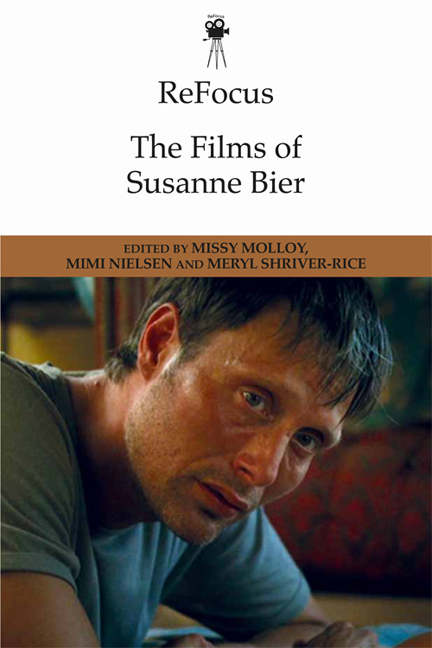Book contents
- Frontmatter
- Contents
- List of Figures
- Notes on Contributors
- Foreword
- Introduction: Susanne Bier's Boundary-Crossing Screen Authorship
- Part 1 Generic and Industrial Fluidity
- Part 2 Negotiating Identity
- Part 3 Authorship and Aesthetics
- Part 4 Transnational Reach
- Postscript: A Conversation with Susanne Bier
- Filmography of Susanne Bier
- Acknowledgments
- Index
13 - Danish Privilege and Responsibility in the Work of Susanne Bier
Published online by Cambridge University Press: 01 May 2021
- Frontmatter
- Contents
- List of Figures
- Notes on Contributors
- Foreword
- Introduction: Susanne Bier's Boundary-Crossing Screen Authorship
- Part 1 Generic and Industrial Fluidity
- Part 2 Negotiating Identity
- Part 3 Authorship and Aesthetics
- Part 4 Transnational Reach
- Postscript: A Conversation with Susanne Bier
- Filmography of Susanne Bier
- Acknowledgments
- Index
Summary
Susanne Bier is both wildly praised and vaguely dismissed by film critics and the Danish public alike for the accessibility, and hence popularity, of her films. Ask a random Dane at a bar in Copenhagen about Susanne Bier and you are likely to hear the phrase “popular movies,” while Americans who are familiar with her work are likely to label her films “art cinema.” This polarizing split is Bier's reception conundrum in a nutshell. Not quite fitting the definition of intellectual European art cinema, and not quite Hollywood, Bier's work straddles a unique space that garners both popular reception and critical praise. This space breaks with the expectations of film critics, who implicitly possess the predisposition that films that are praised for being aesthetically innovative and psychologically or socio-politically heavy hitting are seldom widely loved by the general Hollywood-blockbuster-inclined public. Never mind that Alfred Hitchcock, Alfonso Cuarón, Quentin Tarantino, Gus Van Sant, Guillermo del Toro, Spike Jonze, Alejandro González Iñárritu, Lasse Hallström, Wes Anderson, Sophia Coppola, Tom Hooper, Jane Campion, Ang Lee, and others are all critically acclaimed yet widely popular filmmakers whose works, while generally released in small-town America, also line film school canon lists. Bier's conundrum essentially places her amongst respectable cinematic company—a fact that Hollywood and the BBC have not missed—as she (like her Danish colleague Lone Scherfig) is continuously invited to direct films and television for major English-language production studios.
Arguably Bier's greatest global cinematic successes are what Belinda Smaill refers to as her “male sojourner trilogy,” which includes Brothers (Brødre, 2004), After the Wedding (Efter Brylluppet, 2006), and In a Better World (Hævnen, 2011) (Smaill 2014)—so named because in all three films a Western white male protagonist moves between Denmark and formerly colonized or currently militarized locations. These three protagonists feel an ethical responsibility towards non-Danish people who include Afghan refugees (Brothers), Indian orphans (After the Wedding), and sub-Saharan medical refugees (In a Better World). These men actively choose to spend large portions of their lives abroad as soldiers, orphanage directors, and Médecins Sans Frontières.
- Type
- Chapter
- Information
- ReFocus: The Films of Susanne Bier , pp. 243 - 260Publisher: Edinburgh University PressPrint publication year: 2018



